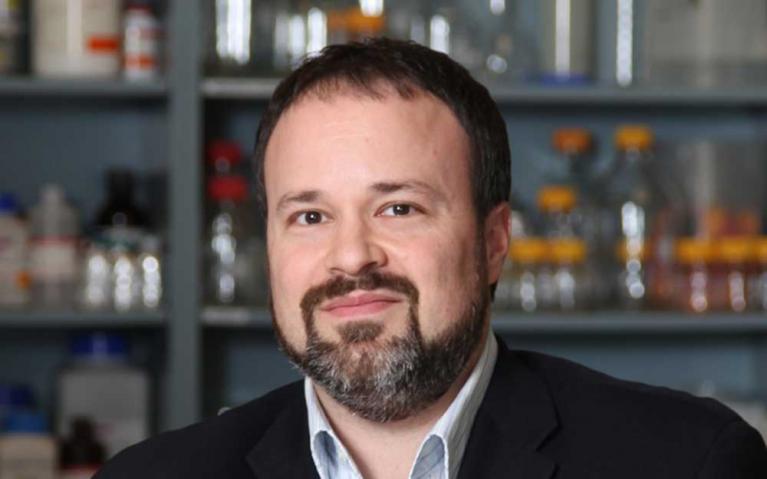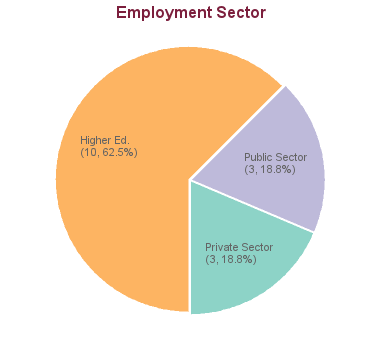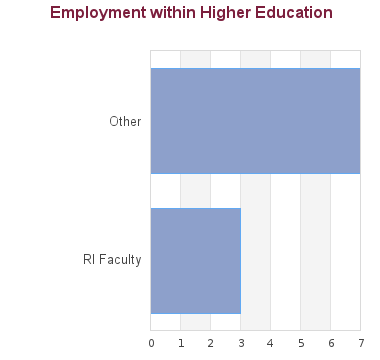
Michael Rauh
Job Title
Attending Hematopathologist and Assistant Professor
Employer
Queen's University

Review details about the recently announced changes to study and work permits that apply to master’s and doctoral degree students. Read more
This is an integrated program jointly offered by the Faculty of Medicine and the Faculty of Graduate and Postdoctoral Studies. Its purpose is to provide selected and highly qualified students the opportunity to combine their medical school experience with intensive scientific training in pursuing a career as clinician-scientists in a chosen field. The program is designed so that students can receive the Doctor of Medicine (MD) and the Doctor of Philosophy (PhD) degrees after successful completion of six to seven years of enrolment. The program is built upon the regular MD curriculum, but is further customized to meet the unique career goals of individual students based on their background, previous research experience, and their chosen medical field of expertise. Graduates of the MD/PhD Program are trained as competent physicians, as well as skilled scientists who can sustain a successful and competitive clinical investigative career.
Because entry to this program requires concurrent admission to the MD Program, it is open to Canadian citizens, permanent residents and persons with refugee status in Canada only. We are therefore unfortunately unable to admit international students to the combined MD/PhD Program, although such applicants remain eligible to pursue direct PhD studies within the many departments of UBC's Faculty of Medicine.
Application to the MD/PhD Program is made by completing: 1) the application form for admission to the MD Program 2) the application form for admission to the MD/PhD Program
The Faculty of Graduate and Postdoctoral Studies establishes the minimum admission requirements common to all applicants, usually a minimum overall average in the B+ range (76% at UBC). The graduate program that you are applying to may have additional requirements. Please review the specific requirements for applicants with credentials from institutions in:
Each program may set higher academic minimum requirements. Please review the program website carefully to understand the program requirements. Meeting the minimum requirements does not guarantee admission as it is a competitive process.
Some programs require additional test scores such as the Graduate Record Examination (GRE) or the Graduate Management Test (GMAT). The requirements for this program are:
The GRE is not required.
The MD/PhD Program considers students from a variety of backgrounds; no preference is given to any particular degree program. The applicant must hold an honours bachelor's degree with an overall average in the 'A' grade range (or equivalent), and have fulfilled all the requirements of acceptance into the four-year medical curriculum of the Faculty of Medicine (including a separate application to that program), and the doctoral requirements of the Faculty of Graduate and Postdoctoral Studies.
Courses in biology, chemistry and biochemistry are strongly recommended but are not required for application. All applicants are expected to demonstrate proficiency in these areas through coursework and/or MCAT scores. Courses in physics, statistics and the social sciences are also recommended as general preparation for the MCAT and for medical school.
Autobiographical essay of research interest. Applicants are required to submit a concise, well organized essay which clearly outlines why you have chosen the Clinician Scientist path as a career in medicine, your perception of the discipline, and the medical field that best matches the area of your research interest.
Besides academic standard, other strengths including maturity, research experience and potential, scholarship, personal qualities, research field of interest, and proposed research supervisor and laboratory are also assessed. In addition to fulfilling the requirements of the regular undergraduate MD curriculum, MD/PhD students will also undertake graduate level coursework as required by their chosen field of research. All MD/PhD students are required to fulfill the PhD portion of the degree in a department which is affiliated with the Faculty of Medicine and listed in the Faculty of Graduate and Postdoctoral Studies. The research supervisor must be a full member of the Faculty of Graduate and Postdoctoral Studies, and is usually from a Department, Interdisciplinary Program or Institute within the Faculty of Medicine. The research supervisor must hold a current CIHR research operating grant or from an equivalent peer-reviewed, federal or provincial granting agency.
All applicants have to submit transcripts from all past post-secondary study. Document submission requirements depend on whether your institution of study is within Canada or outside of Canada.
A minimum of two references are required for application to graduate programs at UBC. Each graduate program determines the type of reference (e.g. academic, professional) and number of references they require which can range from 2 to 4. References should be requested from individuals who are prepared to provide a report on your qualifications for the program.
Many programs require a statement of interest, sometimes called a "statement of intent", "description of research interests" or something similar.
Students in research-based programs usually require a faculty member to function as their thesis supervisor. Please follow the instructions provided by each program whether applicants should contact faculty members.
A unique aspect of the UBC MD/PhD program is that it considers its students to be PhD students throughout the duration of the program. As such, it is to the benefit of the student to have identified a supervisor as early possible. This has the additional advantage of allowing students an early start on their research program, increasing the chance a student will be able to complete a combined MD/PhD degree in 7 years.
Applicants should list potential supervisors at the time of their application. If selected for interview it is expected that applicants will set up virtual meetings with a potential supervisor(s) prior to interviews. The research supervisor proposed by the MD/PhD applicant is one of the criteria we use to rank applicants for admission. As for all graduate students, it is to the applicant’s advantage to demonstrate that they have explored potential supervisors, research environments, and projects and hence to have developed a plan for what research they would like to be doing at UBC. The research supervisor must be eligible to take on graduate students in a Faculty of Medicine-affiliated program at UBC or one of its partner universities, and should hold a current operating grant from CIHR or an equivalent peer-reviewed, federal or provincial granting agency in order to provide an appropriate research environment to support an MD/PhD student. Successful applicants will have ~5 months between accepting an offer for admission and actually beginning the program, during which time they can finalize their decision about supervisor. Of note, it is possible to change supervisor during the first two years of the program.
Permanent Residents of Canada must provide a clear photocopy of both sides of the Permanent Resident card.
All applicants must complete an online application form and pay the application fee to be considered for admission to UBC.
Research Areas: Public Health, Neuroscience, Biochemistry, Biomedical Engineering, Medical Genetics, Pathology & Laboratory Medicine, Urology, Sports Medicine, and more.
Years 1 and 2 - MD curriculum (Years 1 and 2), Years 2 to 5 - Graduate Coursework & PhD research, Years 6 and 7 - MD curriculum (Years 3 and 4)
UBC’s MD Undergraduate Program offers our students the opportunity to train at one of four geographically distinct sites in British Columbia: UBC’s Vancouver campus in Vancouver (Vancouver-Fraser Medical Program), UBC’s Okanagan campus in Kelowna (Southern Medical Program), the University of Victoria on Vancouver Island (Island Medical Program), or the University of Northern British Columbia in Prince George (Northern Medical Program). MD/PhD students can propose to undertake their training at any of these four sites.
We welcome applications from Canadians and permanent residents of Canada, including those who currently reside outside Canada. We also welcome applications from persons with refugee status in Canada. We regret that we cannot admit international students.
| Fees | Canadian Citizen / Permanent Resident / Refugee / Diplomat | International |
|---|---|---|
| Application Fee | $116.25 | Not applicable |
| Tuition * | ||
| Installments per year | 3 | Not applicable |
| Tuition per installment | $1,950.03 | Not applicable |
| Tuition per year (plus annual increase, usually 2%-5%) | $5,850.09 | Not applicable |
| Int. Tuition Award (ITA) per year (if eligible) | Not applicable | |
| Other Fees and Costs | ||
| Student Fees (yearly) | $1,144.10 (approx.) | |
| Costs of living | Estimate your costs of living with our interactive tool in order to start developing a financial plan for your graduate studies. | |
| Deposit to accept offer (if admitted) | ||
| Deposit requirement | $1000.00 | $0.00 |
Applicants to UBC have access to a variety of funding options, including merit-based (i.e. based on your academic performance) and need-based (i.e. based on your financial situation) opportunities.
All MD/PhD students receive a studentship award through the MD/PhD Program (annual stipend $27,000, renewable each year for a maximum of 6 years).
All applicants are encouraged to review the awards listing to identify potential opportunities to fund their graduate education. The database lists merit-based scholarships and awards and allows for filtering by various criteria, such as domestic vs. international or degree level.
Many professors are able to provide Research Assistantships (GRA) from their research grants to support full-time graduate students studying under their supervision. The duties constitute part of the student's graduate degree requirements. A Graduate Research Assistantship is considered a form of fellowship for a period of graduate study and is therefore not covered by a collective agreement. Stipends vary widely, and are dependent on the field of study and the type of research grant from which the assistantship is being funded.
Graduate programs may have Teaching Assistantships available for registered full-time graduate students. Full teaching assistantships involve 12 hours work per week in preparation, lecturing, or laboratory instruction although many graduate programs offer partial TA appointments at less than 12 hours per week. Teaching assistantship rates are set by collective bargaining between the University and the Teaching Assistants' Union.
Academic Assistantships are employment opportunities to perform work that is relevant to the university or to an individual faculty member, but not to support the student’s graduate research and thesis. Wages are considered regular earnings and when paid monthly, include vacation pay.
Canadian and US applicants may qualify for governmental loans to finance their studies. Please review eligibility and types of loans.
All students may be able to access private sector or bank loans.
Many foreign governments provide support to their citizens in pursuing education abroad. International applicants should check the various governmental resources in their home country, such as the Department of Education, for available scholarships.
The possibility to pursue work to supplement income may depend on the demands the program has on students. It should be carefully weighed if work leads to prolonged program durations or whether work placements can be meaningfully embedded into a program.
International students enrolled as full-time students with a valid study permit can work on campus for unlimited hours and work off-campus for no more than 24 hours a week during academic sessions.
A good starting point to explore student jobs is the UBC Work Learn program or a Co-Op placement.
Students with taxable income in Canada may be able to claim federal or provincial tax credits.
Canadian residents with RRSP accounts may be able to use the Lifelong Learning Plan (LLP) which allows students to withdraw amounts from their registered retirement savings plan (RRSPs) to finance full-time training or education for themselves or their partner.
Please review Filing taxes in Canada on the student services website for more information.
Applicants have access to the cost estimator to develop a financial plan that takes into account various income sources and expenses.
19 students graduated between 2005 and 2013: 1 graduate is seeking employment; for 2 we have no data (based on research conducted between Feb-May 2016). For the remaining 16 graduates:


MD/PhD students are trained to translate basic discoveries into improving diagnosis, treatment and prevention of disease in patients. MD/PhD graduates have been highly successful in reaching the program's intended goal of a clinician-scientist career, including staff positions at universities.
These statistics show data for the Doctor of Medicine and Doctor of Philosophy (MDPhD). Data are separated for each degree program combination. You may view data for other degree options in the respective program profile.
| 2023 | 2022 | 2021 | 2020 | 2019 | |
|---|---|---|---|---|---|
| Applications | 60 | 73 | 77 | 60 | 53 |
| Offers | 4 | 5 | 8 | 4 | 5 |
| New Enrolment | 3 | 4 | 8 | 4 | 4 |
| Total Enrolment | 32 | 33 | 31 | 29 | 29 |
Students in research-based programs usually require a faculty member to function as their thesis supervisor. Please follow the instructions provided by each program whether applicants should contact faculty members.
A unique aspect of the UBC MD/PhD program is that it considers its students to be PhD students throughout the duration of the program. As such, it is to the benefit of the student to have identified a supervisor as early possible. This has the additional advantage of allowing students an early start on their research program, increasing the chance a student will be able to complete a combined MD/PhD degree in 7 years.
Applicants should list potential supervisors at the time of their application. If selected for interview it is expected that applicants will set up virtual meetings with a potential supervisor(s) prior to interviews. The research supervisor proposed by the MD/PhD applicant is one of the criteria we use to rank applicants for admission. As for all graduate students, it is to the applicant’s advantage to demonstrate that they have explored potential supervisors, research environments, and projects and hence to have developed a plan for what research they would like to be doing at UBC. The research supervisor must be eligible to take on graduate students in a Faculty of Medicine-affiliated program at UBC or one of its partner universities, and should hold a current operating grant from CIHR or an equivalent peer-reviewed, federal or provincial granting agency in order to provide an appropriate research environment to support an MD/PhD student. Successful applicants will have ~5 months between accepting an offer for admission and actually beginning the program, during which time they can finalize their decision about supervisor. Of note, it is possible to change supervisor during the first two years of the program.
These videos contain some general advice from faculty across UBC on finding and reaching out to a supervisor. They are not program specific.
| Year | Citation |
|---|---|
| 2015 | Dr. Copley studied developmental changes in blood stem cells. He showed that such changes are regulated by a molecular pathway that is controlled at the level of the stem cell itself. This research may inform methods to expand blood stem cells and help to explain the unique behaviour of childhood leukemias compared to adult leukemias. |
| 2014 | Dr. McVea studied brain activity in the newborn and adult brain. He found new, previously unrecognized patterns of activity in the newborn brain that may help prepare the brain for more mature patterns in later life. Knowledge of this activity may help develop treatments for those with brain injuries, as well as disorders of brain development |
| 2012 | Dr. Heine conducted research into stem cells and the way blood vessels regenerate. She implanted a device, similar to a petri dish, which allows the study of cells within the living body. Her work revealed that there are subtle and complex relationships between cells under different conditions. The findings will contribute to advancements in stem cell research. |
| 2012 | Dr. Astanehe studied the molecular mechanisms involved in breast cancer pathology and chemotherapy resistance. His studiescontribute to describing breast cancer disease processes. He has also identified novel therapeutic targets to improve outcomes for women with breast cancer pathology with poor prognoses. |
| 2012 | Dr. Berkhout examined the role of social identity in gender-based disparities to using antiretroviral therapy in Vancouver's inner city. Her work demonstrated how social interests, institutional authorities, relations of power, and strategies of social control are resisted and internalized by women negotiating HIV/AIDS care. Using feminist philosophy and social studies of medicine, Dr. Berkhout reframes adherence issues using agency and autonomy. |
| 2012 | Dr. Kozoriz examined how gap junction proteins play a role in cellular damage. His work furthers our understanding of how these proteins can protect the brain during injury. |
| 2012 | Dr. Eadie investigated brain plasticity in a model of Fragile-X syndrome, the most common form of inherited intellectual disability. He discovered abnormalities in neuronal morphology and physiology in a brain region associated with learning and emotion, thereby identifying a novel therapeutic target. |
Departments/Programs may update graduate degree program details through the Faculty & Staff portal. To update contact details for application inquiries, please use this form.

Here, you can choose from more than 300 graduate degree program options and 2000+ research supervisors. You can even design your own program.